Filter books by:
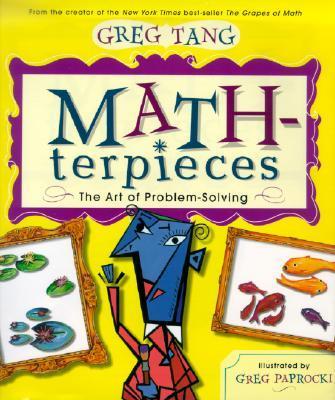
Mathterpieces: The Art of Problem-Solving
Australian Curriculum Year Level
Year 2, Year 3, Foundation Year, Year 1
Maths Concepts
Australian Curriculum: Description
Foundation Year – Subitise small collections of objects (ACMNA003);
Year 1 – Represent and solve simple addition and subtraction problems using a range of strategies including counting on, partitioning, and rearranging parts (ACMNA015);
Year 2 – Describe, continue, and create number patterns resulting from performing addition or subtraction (ACMNA035).
Teaching ideas
Students investigate other situations involving subitising and counting on with and without distractors in routine and non-routine situations. Students could write the number sentences represented by art in this book (representational to abstract).
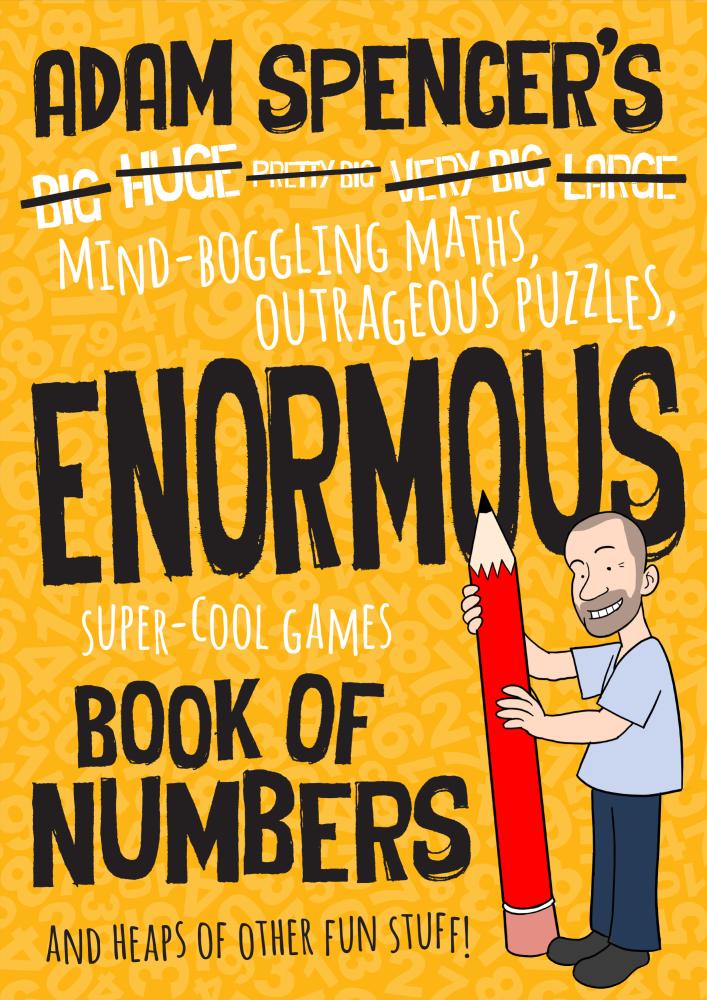
Adam Spencer’s Mind-Boggling Maths, Outrageous Puzzles, Enormous Super-Cool Games Book of Numbers and heaps of other fun stuff!
Strand
Algebra
Australian Curriculum Year Level
Year 5, Year 6, Year 7, Year 2, Year 3, Year 8, Year 4, Foundation Year, Year 1, Year 9
Multiplication and Division Triangle, Part-Part-Whole, Benchmarking, Find the Pattern, Draw what you can't see
Australian Curriculum: Description
Prep-Sort, describe and name familiar two-dimensional shapes and three-dimensional objects in the environment (ACMMG009); YR1-Recognise and classify familiar two-dimensional shapes and three-dimensional objects using obvious features (ACMMG022); YR2-Describe the features of three-dimensional objects (ACMMG043); YR3-Identify symmetry in the environment (ACMMG066); YR4-Investigate number sequences involving multiples of 3, 4, 6, 7, 8, and 9 (ACMNA074); YR5-Use efficient mental and written strategies and apply appropriate digital technologies to solve problems (ACMNA291); YR6-Construct simple prisms and pyramids (ACMMG140); YR7-Draw different views of prisms and solids formed from combinations of prisms (ACMMG161); YR8-Solve a range of problems involving rates and ratios, with and without digital technologies (ACMNA188); YR9-Express numbers in scientific notation (ACMNA210)
Teaching ideas
Real-world application in this book. Cross-curricular links are strong too, science, humanities, music, HPE etc
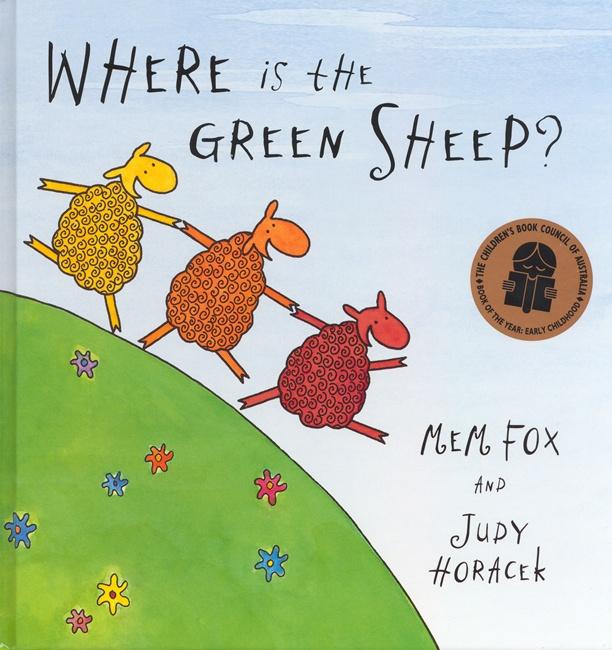
Where is the Green Sheep?
Strand
Algebra
Australian Curriculum Year Level
Foundation Year, Year 1
Act it Out
Australian Curriculum: Description
Sort and classify familiar objects and explain the basis for these classifications. Copy, continue and create patterns with objects and drawings (ACMNA005); 1-Investigate and describe number patterns formed by skip-counting and patterns with objects (ACMNA018)
Teaching ideas
Subitising small numbers, patterns
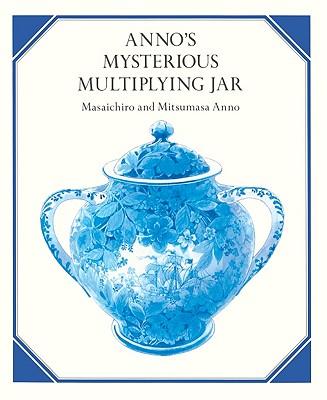
Anno’s Mysterious Multiplying Jar
Strand
Number
Look for a pattern
Australian Curriculum: Description
Select and apply efficient mental and written strategies and appropriate digital technologies to solve problems involving all four operations with whole numbers (ACMNA123)
Teaching ideas
At a year 6 level, factorial numbers can be used to help students understand and be able to explain the power of the operation of multiplication in contrast with addition. Specialist Mathematics in the Senior Secondary Mathematics Curriculum (ACARA) covers the concept of factorial notation (ACMSM003).
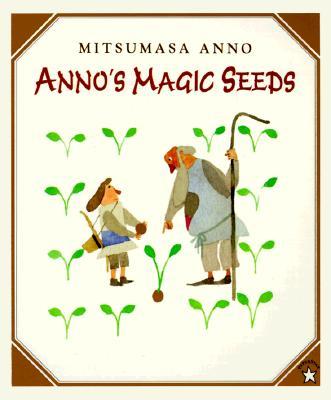
Anno’s Magic Seeds
Australian Curriculum: Description
Solve word problems by using number sentences involving multiplication or division where there is no remainder (ACMNA082); Find unknown quantities in number sentences involving addition and subtraction and identify equivalent number sentences involving addition and subtraction (ACMNA083)
Teaching ideas
Explore other patterns such as square numbers, triangular numbers, Fibonacci sequence etc.
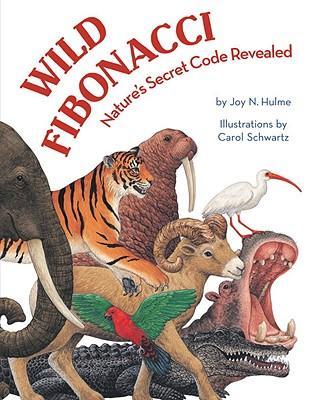
Wild Fibonacci: Nature’s Secret Code Revealed
Strand
Algebra
Maths Concepts
Australian Curriculum: Description
Describe, continue, and create number patterns resulting from performing addition or subtraction (ACMNA060); 4-Find unknown quantities in number sentences involving addition and subtraction and identify equivalent number sentences involving addition and subtraction (ACMNA083)
Teaching ideas
Puzzle collaboration to create some summary notes for the maths workbook. Like the clip titled Fibonacci Numbers: Identifying Patterns on Teaching Channel
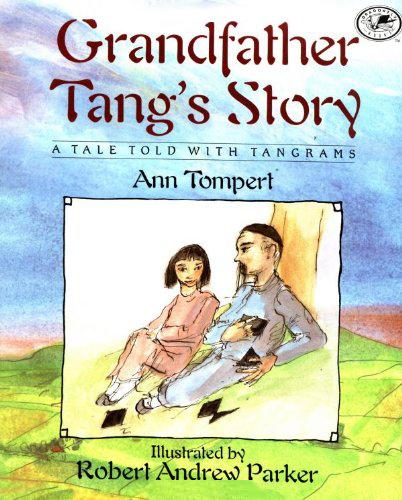
Grandfather Tang’s Story: A tale told with tangrams
Strand
Space
Australian Curriculum: Description
ACMMG009; ACMMG010; ACMMG022; ACMMG042; ACMMG064; ACMMG088; ACMMG089; ACMMG091; ACMMG112; ACMMG113; ACMMG141; ACMMG142; ACMMG165; ACMMG166
Teaching ideas
Constructing tangrams, barrier games, jigsaws, tangram teasers, exploring triangles, oblongs, parallelograms, trapeziums, areas, polygons, hexagons, angles

Mirror
Strand
Algebra
Australian Curriculum Year Level
Foundation Year, Year 1
Act it Out
Australian Curriculum: Description
Sort and classify familiar objects and explain the basis for these classifications. Copy, continue and create patterns with objects and drawings (ACMNA005); Investigate and describe number patterns formed by skip-counting and patterns with objects (ACMNA018)
Teaching ideas
Other activities that involve recognising patterns of objects.
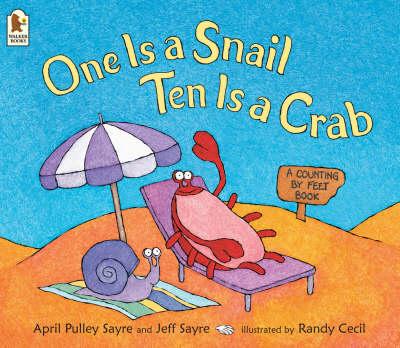
One is a Snail Ten is a Crab
Strand
Number
Australian Curriculum Year Level
Year 4
Multiplication and Division Triangle, Part-Part-Whole, Additive to Multiplicative Thinking
Maths Concepts
Australian Curriculum: Description
Recall multiplication facts up to 10 × 10 and related division facts (ACMNA075)
Teaching ideas
Use other objects to represent multiplicative thinking

Matherpieces: The Art of Problem-Solving
Strand
Number
Australian Curriculum Year Level
Year 2, Year 3, Foundation Year, Year 1
Maths Concepts
Australian Curriculum: Description
Subitise small collections of objects (ACMNA003); Represent and solve simple addition and subtraction problems using a range of strategies including counting on, partitioning and rearranging parts (ACMNA015); Describe, continue, and create number patterns resulting from performing addition or subtraction
